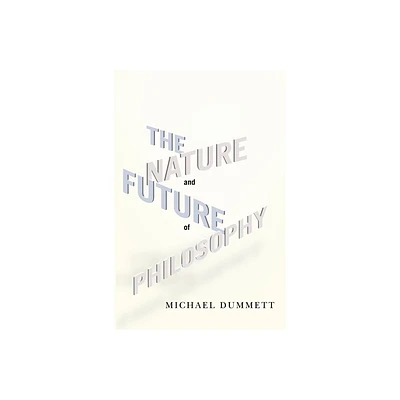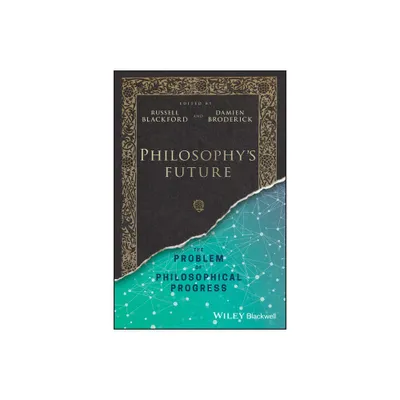Home
the Philosophy of Future
Loading Inventory...
Barnes and Noble
the Philosophy of Future
Current price: $28.52


Barnes and Noble
the Philosophy of Future
Current price: $28.52
Loading Inventory...
Size: Hardcover
*Product Information may vary - to confirm product availability, pricing, and additional information please contact Barnes and Noble
"The Philosophy of the Future" which has cost the author 'more than half a century of toil', is a stout defense of the principle of Causation both against the philosophical scientists who, following Hume, would reduce cause to customary sequence among our sense-impressions, and against the subordination by many writers on logic of the notion of cause to that of reason or ground. To cancel causality is to efface all distinction between truth and falsehood. "Scientia est cognoscere causas." "The sole essential function of all thinking is to discriminate between cause and effect." "There is no known form of thought which is not ultimately reducible into an assertion of cause and effect." From the vantage ground of this theorem, with its corollary that "a cause cannot be known except through its effects, or an effect apart from its cause", Mr. Hebberd trains his guns upon the systems of Hume, Kant, Hegel, Mill, and other logical writers. He reviews successively Space, Time, the Concept, Judgment, and finally Induction, defined as "the discovery of causal processes by means of physical and mental experiment", in the attempt to show that all categories are but species and derivative forms under the supreme and all-embracing category of causality.
The logical discussion is followed by chapters on God, Freedom and the Soul, in which the metaphysical application of his principles is made. The causal concept is utilized to strengthen the ontological argument. "The conception of a sufficient cause, fully understood, is identical with the theistic conception of God." This conception of a sufficient cause involves unity, infinitude, freedom and love (if an infinite being acts at all, or causes any changes, it must be for the sake of others). The fact again that the causal nexus is "a reality imperceptible to the senses" discredits materialism and positivism, and is used in demonstration of the existence and immortality of the soul.
Mr. Hebberd attempts no exact definition of cause, but this, as he says in the appendix, is because he regards it as incapable of ordinary definition, "there being no wider genus under which it can be ranged as a species" (p. 214). He omits also any discussion of the origin of the causal concept. While frequently inveighing against innate ideas and Kantian apriorities, and rejecting impartially "the Scottish philosophy of 'common sense', with its short and easy method of 'intuitions', the French and English empiricism, the Teutonic illusionism" (p. 95) he yet declares: "Man does come into the world equipped, not with intuitions, but with the means of attaining to an assured knowledge of the world as the workmanship of an infinite and benevolent Being. For he comes endowed with the prerogative of thought; but to think is to affirm causality" (p. 157). What is this but intuitionism?
Mr. Hebberd's work, it will be seen, is a discussion at once ambitious and concise of the deepest problems of logic and metaphysics. His book, in our judgment, is well worth the attention of the philosophical reader, who cannot but enjoy its incisive style, its trenchant criticisms, its wide outlook upon philosophic thought, and its original insights into its problems.
–The Princeton Theological Review, Vol. 12 [1914]
The logical discussion is followed by chapters on God, Freedom and the Soul, in which the metaphysical application of his principles is made. The causal concept is utilized to strengthen the ontological argument. "The conception of a sufficient cause, fully understood, is identical with the theistic conception of God." This conception of a sufficient cause involves unity, infinitude, freedom and love (if an infinite being acts at all, or causes any changes, it must be for the sake of others). The fact again that the causal nexus is "a reality imperceptible to the senses" discredits materialism and positivism, and is used in demonstration of the existence and immortality of the soul.
Mr. Hebberd attempts no exact definition of cause, but this, as he says in the appendix, is because he regards it as incapable of ordinary definition, "there being no wider genus under which it can be ranged as a species" (p. 214). He omits also any discussion of the origin of the causal concept. While frequently inveighing against innate ideas and Kantian apriorities, and rejecting impartially "the Scottish philosophy of 'common sense', with its short and easy method of 'intuitions', the French and English empiricism, the Teutonic illusionism" (p. 95) he yet declares: "Man does come into the world equipped, not with intuitions, but with the means of attaining to an assured knowledge of the world as the workmanship of an infinite and benevolent Being. For he comes endowed with the prerogative of thought; but to think is to affirm causality" (p. 157). What is this but intuitionism?
Mr. Hebberd's work, it will be seen, is a discussion at once ambitious and concise of the deepest problems of logic and metaphysics. His book, in our judgment, is well worth the attention of the philosophical reader, who cannot but enjoy its incisive style, its trenchant criticisms, its wide outlook upon philosophic thought, and its original insights into its problems.
–The Princeton Theological Review, Vol. 12 [1914]


















